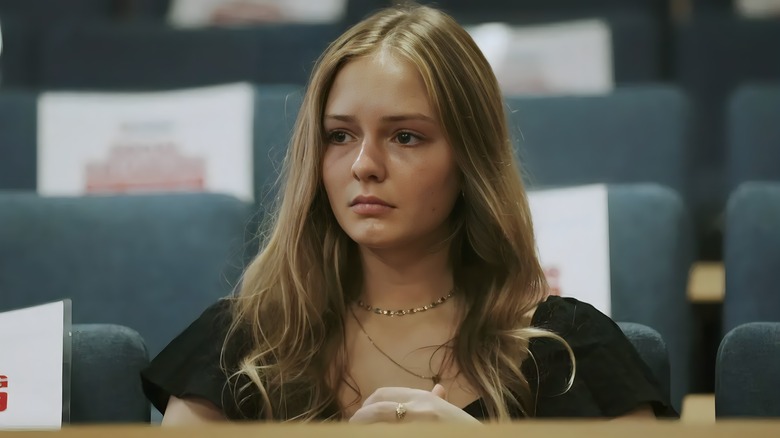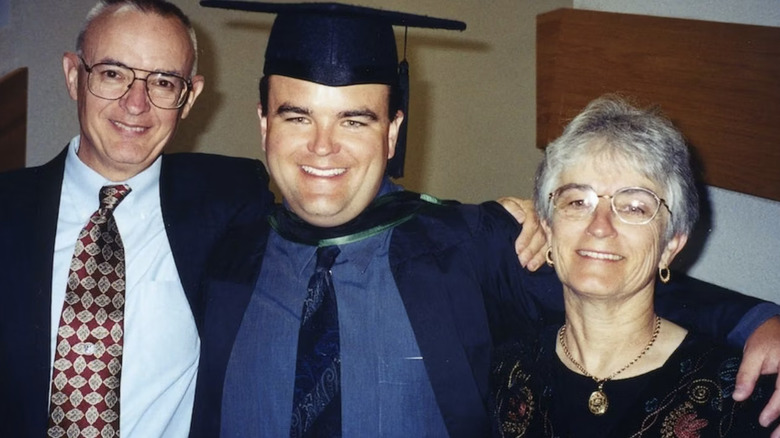Netflix's Take Care Of Maya Is Reminding Viewers Of The Saddest Documentary Ever Made
Maya Kowalski was brought to the prestigious Johns Hopkins All Children's Hospital when she was only nine years old, suffering from a rare, debilitating condition called complex regional pain syndrome, or CRPS. The ailment triggers extreme pain, often a burning sensation, and has been shown to be alleviated with controlled doses of ketamine. The condition baffled her nurse mother, Beata, but the quest to seek help for Maya ended in an unthinkable tragedy and exposed a systemic nightmare in America's healthcare sector.
The new documentary for Netflix, "Take Care of Maya" is about the curious case of not just Maya Kowalski, but many, many families throughout the state of Florida that were impacted by Dr. Sally Smith and Suncoast Advocacy Services. Beata Kowalski was adamant about finding a proper diagnosis and treatment plan for her sick daughter, which to Dr. Sally Smith and her team, indicated an instance of Munchausen syndrome by proxy, and the formal diagnosis resulted in Maya being separated from her family. The separation completely rocked the Kowalski family and led to a permanent, cataclysmic change that will impact them forever.
Unbelievably, this is just the tip of the iceberg of the disasters connected to Dr. Smith and Suncoast Advocacy Services. As the minutes pass by in "Take Care of Maya," the documentary becomes sadder and more heartbreaking, compounding traumatic events with such fervor it's hard to stomach that everything we're seeing, is something that happened in real life. The emotional depredation is shocking and unexpected, echoing a feeling that can only be matched by what many consider to be the saddest documentary ever made, "Dear Zachary: A Letter to a Son About His Father."
What is Dear Zachary about?
If you've not seen "Dear Zachary: A Letter to a Son About His Father," consider this a trigger warning for some deeply upsetting situations. Written, produced, directed, edited, and scored by Kurt Kuenne, "Dear Zachary" was intended to be a documentary chronicling the life of Andrew Bagby, Kuenne's lifelong friend and a gifted physician who was murdered by his ex-girlfriend, Shirley Turner. Following Andrew's death, it was revealed that Turner was pregnant with Bagby's child, and the film was an attempt at documenting the life and impact Bagby had on those who knew him, something to help baby Zachary get to know the father he would never have a chance to meet.
The documentary wasn't supposed to become a true crime expose, but that's exactly what it became after Bagby's parents, David and Kathleen, fought for custody of baby Zachary as his mother was one of the lead suspects in Andrew's murder. From here, the documentary shifts into a film highlighting the failures of the legal systems in place meant to protect children and descends into an even more unfathomable catastrophe that often leaves viewers permanently changed. "Dear Zachary" is a film loaded with so much emotional weight and such inconceivable terror it's hard to even begin to comprehend the truths that are presented. If there's any silver lining to be found, thanks to the popularity of the documentary and the tireless activism of David and Kathleen Bagby, a law was eventually passed in Canada named after Zachary in an attempt to ensure that what happens in "Dear Zachary" will never happen to another family ever again.
As of the release of "Take Care of Maya" on Netflix, the Kowalski family is still pursuing a legal case against Johns Hopkins All Children's Hospital, which has a court date in September 2023. May they be as victorious as the Bagby family.
Audiences all over have noticed the similarities
On the Reddit forum r/TrueCrimeDiscussion, a mini-conversation broke out between users who all recognized the connective, and harrowing similarities between "Take Care of Maya" and "Dear Zachary." As u/deadlifeguard wrote, "I've seen 'Dear Zachary' and I thought nothing could be worse than that, but this one hit me harder for whatever reason." Many commenters echoed in agreement, with u/fuglysack14 commenting that the heartbreak of watching "Dear Zachary" has actually prevented them from watching films like "Take Care of Maya" or the series "The Trials of Gabriel Fernandez." They wrote, "The little that I do know about each of those cases has horrified me sufficiently enough to keep me away from them. My heart cannot take the devastation."
The sentiment was shared across social media platforms, as Twitter user @LilPenguin222 wrote, "#TakeCareOfMaya #Netflix is one of THE most heartbreaking docs I've seen [...] it's on [the] level of 'Dear Zachary: Letter to Son [About] His Father.'" User @_JessicaBianca tweeted that the film "crushed me almost as bad as 'Dear Zachary,'" while @Andrewjja14 recommended people check out the documentary following their Netflix watch because both films reveal that "evil people hiding behind the 'law' need bringing to justice."
The fact that both "Take Care of Maya" and "Dear Zachary" have been so emotionally impactful is not just a sign of quality documentary filmmaking, but a reminder that preventable atrocities happen every day at the hands of the systems that are supposed to protect us all. It's endlessly frustrating to see in real-time the extremes that it takes for those with the ability to enact change to step in and put a stop to corruption and selfish, systemic abuse. We can only hope that films like these will motivate those watching at home to join the fight and help put pressure on the powers that be to put an end to future preventable tragedies.


